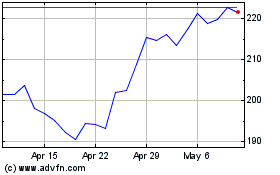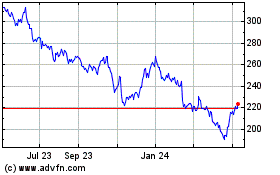Biogen Receives U.S. FDA Breakthrough Therapy Designation for Felzartamab for the Treatment of Antibody-Mediated Rejection in Kidney Transplant Recipients
09 October 2024 - 10:30PM

Biogen Inc. (Nasdaq: BIIB) – Biogen announced today that
felzartamab, an investigational anti-CD38 monoclonal antibody, has
received Breakthrough Therapy Designation (BTD) from the U.S. Food
and Drug Administration (FDA) for the treatment of late
antibody-mediated rejection (AMR) without T-cell mediated rejection
in kidney transplant patients. The FDA grants BTD to drug
candidates for serious or life-threatening conditions and that have
preliminary clinical evidence demonstrating potential to provide
substantial improvement over existing therapies. The designation
provides additional opportunities to engage the FDA and to support
the drug development program through Fast Track designation
features.
Data from the clinical development program that supported the
designation were published in the New England Journal of Medicine
and presented as a late-breaking presentation at the 61st European
Renal Association (ERA) Congress in Stockholm, May 2024.
"Antibody-mediated rejection is a major reason why kidney
transplants fail, and currently patients suffering from AMR have
tremendous unmet medical need,” said Travis Murdoch, Head of HI-Bio
at Biogen. “We are focused on tackling this important challenge,
and the breakthrough therapy designation will enable us to work
efficiently with the FDA to accelerate development of felzartamab
in AMR.”
Felzartamab previously received BTD and Orphan Drug Designation
(ODD) from the FDA for development in the treatment of primary
membranous nephropathy (PMN) and ODD in the treatment of AMR in
kidney transplant recipients. Phase 2 studies have been completed
in AMR, PMN and IgA nephropathy (IgAN). Biogen plans to initiate
Phase 3 trials for felzartamab across AMR, IgAN, and PMN in
2025.
Biogen acquired Human Immunology Biosciences (HI-Bio) in July
2024.
About FelzartamabFelzartamab is an
investigational therapeutic human monoclonal antibody directed
against CD38, a protein expressed on mature plasma cells.
Felzartamab has been shown in clinical studies to selectively
deplete CD38+ plasma cells, which may allow applications that
ultimately improve clinical outcomes in a broad range of diseases
driven by pathogenic antibodies. Felzartamab was originally
developed by MorphoSys AG for multiple myeloma. HI-Bio exclusively
licensed the rights to develop and commercialize felzartamab across
all indications in all countries and territories excluding China
(including Macau and Hong Kong and Taiwan).
Felzartamab is an investigational therapeutic candidate that has
not yet been approved by any regulatory authority and its safety
and effectiveness have not been established.
About Antibody-Mediated Rejection (AMR) in Kidney
Transplant RecipientsAntibody-mediated rejection (AMR) is
a major cause of kidney transplant failure, with chronic AMR
affecting ~12% of patients that receive kidney transplants annually
in the U.S.1 AMR has emerged as the leading cause of late
graft loss in kidney transplant recipients. Effective treatment
options for chronic AMR are currently limited.2
About BiogenFounded in 1978, Biogen is a
leading biotechnology company that pioneers innovative science to
deliver new medicines to transform patients’ lives and to create
value for shareholders and our communities. We apply deep
understanding of human biology and leverage different modalities to
advance first-in-class treatments or therapies that deliver
superior outcomes. Our approach is to take bold risks, balanced
with return on investment to deliver long-term growth.
We routinely post information that may be important to investors
on our website at www.biogen.com. Follow us on social
media - Facebook, LinkedIn, X, YouTube.
Biogen Safe Harbor This news release
contains forward-looking statements, including related to the
potential clinical effects of felzartamab; the potential benefits,
safety and efficacy of felzartamab; the clinical development
program for felzartamab; the identification and treatment of AMR;
our research and development program for the treatment of AMR; the
potential of our commercial business and pipeline programs,
including SPINRAZA; and risks and uncertainties associated with
drug development and commercialization. These forward-looking
statements may be accompanied by words such as “aim,” “anticipate,”
“believe,” “could,” “estimate,” “expect,” “forecast,” “intend,”
“may,” “plan,” “potential,” “possible,” “will,” “would” and other
words and terms of similar meaning. Drug development and
commercialization involve a high degree of risk, and only a small
number of research and development programs result in
commercialization of a product. Results in early-stage clinical
trials may not be indicative of full results or results from later
stage or larger scale clinical trials and do not ensure regulatory
approval. You should not place undue reliance on our
forward-looking statements.
These statements involve risks and uncertainties that could
cause actual results to differ materially from those reflected in
such statements, including without limitation, uncertainty of
success in the development and potential commercialization of
SPINRAZA; the risk that we may not fully enroll our clinical trials
or enrollment will take longer than expected; unexpected concerns
may arise from additional data, analysis or results obtained during
our clinical trials; regulatory authorities may require additional
information or further studies, or may fail or refuse to approve or
may delay approval of our drug candidates, including SPINRAZA; the
occurrence of adverse safety events; the risks of unexpected
hurdles, costs or delays; failure to protect and enforce our data,
intellectual property and other proprietary rights and
uncertainties relating to intellectual property claims and
challenges; product liability claims; results of operations and
financial condition. The foregoing sets forth many, but not all, of
the factors that could cause actual results to differ from our
expectations in any forward-looking statement. Investors should
consider this cautionary statement, as well as the risk factors
identified in our most recent annual or quarterly report and in
other reports we have filed with the U.S. Securities and Exchange
Commission. These statements speak only as of the date of this news
release.
We do not undertake any obligation to publicly update any
forward-looking statements.
References:
- Schinstock et al. (2018) Kidney Transplant with Low Levels of
DSA or Low Positive B-Flow Crossmatch: An Underappreciated Option
for Highly-Sensitized Transplant Candidates (Page 8). Available
at: https://www.ncbi.nlm.nih.gov/pmc/articles/PMC5481511/pdf/nihms837168.pdf#page=8 ;
Ciancio et al. 2018 Antibody-Mediated Rejection Implies
a Poor Prognosis in Kidney Transplantation: Results From a Single
Center. Available at:
https://onlinelibrary.wiley.com/doi/10.1111/ctr.13392
- Rodriguez-Ramirez et al. 2022 Antibody-mediated rejection:
prevention, monitoring and treatment dilemmas (Page 1). Available
at: https://www.ncbi.nlm.nih.gov/pmc/articles/PMC9475491/
|
MEDIA CONTACT:Jack Cox+ 1 781 464
3260public.affairs@biogen.com |
INVESTOR CONTACT:Stephen Amato+1 781 464 2442IR@biogen.com |
Biogen (NASDAQ:BIIB)
Historical Stock Chart
From Dec 2024 to Jan 2025

Biogen (NASDAQ:BIIB)
Historical Stock Chart
From Jan 2024 to Jan 2025
